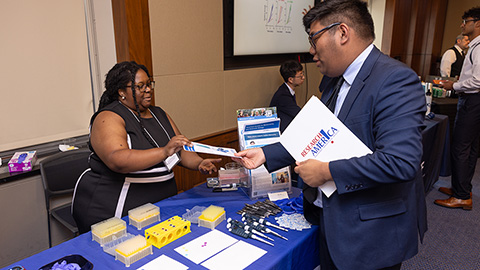What did and didn’t make it
The American Society for Biochemistry and Molecular Biology reviewed the National Institute of Health’s Center for Scientific Review’s strategic plan for FY 2022–2027, released on Sept. 22, and found most of the society's recommendations for training and engagement were embedded in the CSR’s current and future priorities to improve the peer-review process.
There are five overarching goals in the plan:
-
Maintain scientific review groups that provide appropriate scientific coverage and review settings for all of NIH science.
-
Further develop a large cadre of diverse, well-trained and scientifically qualified experts to serve as reviewers.
-
Further develop an outstanding, engaged, and diverse staff.
-
Implement changes to the peer-review process to make it more fair, effective and efficient.
-
Achieve the agency's mission through transparency, engagement with the scientific community and a data-driven approach to decision-making.
In March, the ASBMB was one of 13 scientific societies to make recommendations to CSR’s draft strategic plan. Two of the society’s recommendations were incorporated: (1) integrating diverse communities and organizations as stakeholders and (2) ensuring CSR staff and reviewers are properly trained to mitigate bias. However, the ASBMB’s concern that artificial intelligence in peer review could introduce bias was not addressed in the final strategic plan.
In the next five years, the CSR aims to leverage data and technology to automate parts of the peer-review process, such as robotic process automation and artificial intelligence. The center reasoned that using automation will “reduce administrative burden and allows staff to focus on the core principles of review."
Artificial intelligence has exacerbated certain biases against historically marginalized groups in the past, especially underrepresented racial groups. To raise awareness of this pressing social and technological issue, the ASBMB Women in Biochemistry and Molecular Biology committee sponsored a viewing of the film “Coded Bias,” a documentary that delves into the multiple biases embedded in modern technology, in May of this year.
The society supports the overarching goal of reducing the administrative burden of menial tasks performed by program officers, but it encourages the CSR to consider its earlier recommendation to collaborate with experts (such as those at the NIH Artificial Intelligence/Machine Learning Consortium to Advance Health Equity and Researcher Diversity) when using artificial intelligence in the peer-review process to make sure that the technology is not biased against scientists from historically marginalized groups.
There were several other exciting objectives in the strategic plan to achieve the CSR’s outlined goals, including:
-
The continued emphasis of the Early Career Review Program to recruit the next generation of reviewers from diverse backgrounds.
-
A commitment to increase the number of reviewers with disabilities.
-
Efforts to mitigate bias during peer review will continue and increase in focus.
-
A plan to increase CSR’s outreach to institutions with relatively low levels of NIH funding and minority-serving institutions.
The ASBMB is enthusiastic about all the planned improvements to the peer-review process over the next five years and looks forward to being a continued stakeholder in the center’s development of new processes and policies.
Enjoy reading ASBMB Today?
Become a member to receive the print edition four times a year and the digital edition monthly.
Learn moreGet the latest from ASBMB Today
Enter your email address, and we’ll send you a weekly email with recent articles, interviews and more.
Latest in Policy
Policy highlights or most popular articles

Embrace your neurodivergence and flourish in college
This guide offers practical advice on setting yourself up for success — learn how to leverage campus resources, work with professors and embrace your strengths.

ASBMB honors Lawrence Tabak with public service award
He will deliver prerecorded remarks at the 2025 ASBMB Annual Meeting in Chicago.

Summer internships in an unpredictable funding environment
With the National Institutes of Health and other institutions canceling summer programs, many students are left scrambling for alternatives. If your program has been canceled or delayed, consider applying for other opportunities or taking a course.

Black excellence in biotech: Shaping the future of an industry
This Black History Month, we highlight the impact of DEI initiatives, trailblazing scientists and industry leaders working to create a more inclusive and scientific community. Discover how you can be part of the movement.

ASBMB releases statement on sustaining U.S. scientific leadership
The society encourages the executive and legislative branches of the U.S. government to continue their support of the nation’s leadership in science.

ASBMB and advocacy: What we accomplished in 2024
PAAC members met with policymakers to advocate for basic scientific research, connected some fellow members with funding opportunities and trained others to advocate for science.


